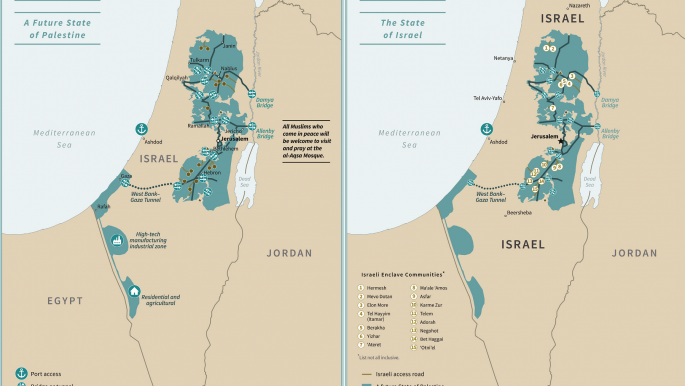UNRWA appeals for funding following Trump's 'Deal of the Century' attack on Palestinian refugee agency
UNRWA's position has been precarious over the past two years, since the United States – which had previously provided about one third of the agency's budget – cut all funding in 2018.
As UNRWA officials launched an appeal for $1.4 billion in funding for its 2020 operations, the agency was facing a new political threat.
The White House proposal for Israel and Palestine unveiled last week, which was developed without input from the Palestinian side and promptly rejected by Palestinian leaders, outlines a nominal two-state solution in which Israeli settlements would remain in the West Bank and Israel would retain control over the borders of the Palestinian state, as well as over the Jordan Valley.
But the plan also envisions dissloving UNRWA and transferring its responsibilities – which include providing education and healthcare as well as other forms of assistance to Palestinian refugees – to the "relevant governments".
Although the plan states this would happen after a peace deal is signed, many of its terms, such as recognising Israeli sovereignty over occupied Palestinian territories, have already been implemented without Palestinian consent.
Read more: Squandering the Palestinian right of return
The document noted that the United States had contributed around $3 billion to UNRWA between 1950 and 2017, but asserted that "UNRWA's mandate, and its multi-generational definition of who constitutes a refugee, has exacerbated the refugee crisis."
|
||
Claudio Cordone director of UNRWA affairs in Lebanon, declined to comment on details of US proposal Tuesday, but noted that his agency's mandate had been renewed by the United Nations General Assembly in December 2019, with 170 countries voting in favor and only two – the United States and Israel – voting against.
"The US position and Israeli position is that UNRWA should disappear and be replaced by something else," Cordone told reporters in Beirut. "That's their view, but we have a mandate from the international community – 170 countries gave their vote, and we're operating on that basis. The day the General Assembly decides we're no longer needed, of course we will go away."
In the meantime, he said, "Our role is to provide assistance and protection to Palestinian refugees until such time as there is a just and lasting solution to their plight."
Such a solution, Cordone said, "cannot be reached unilaterally and cannot be crafted outside of, if not against, the framework of international law defined by the UN Security Council, the General Assembly, and key international human rights and other treaties."
UNRWA is requesting $1.4 billion in funding for 2020 – an increase from its 2019 request for $1.2 billion. The figure includes $806 million for core programmes, $155 million for emergency humanitarian response in the Occupied Territories, $270 million in emergency funding for Syria, and $170 for special projects.
Of that amount, Lebanon would receive $108 from the programme budget and $45 million from the Syria emergency appeal, to respond to the needs of an estimated 27,700 Palestinian refugees from Syria who fled to Lebanon.
Read more: The living spirit of Sumud: Palestinians' form of resistance and steadfastness continues to grow stronger
While other donors stepped in to fill the gap in 2018, the agency has struggled with political as well as financial issues over the past year. Allegations of misconduct by UNRWA's top management led to the resignation of former Commissioner-Genera; Pierre Krahenbuhl in November.
|
||
And as of December 2019, when the General Assembly renewed its mandate, UNRWA was facing a $167 million funding gap.
In order to keep the most essential operations afloat last year, Cordone said, the agency had to borrow $30 million from the UN's Emergency Response Fund as well as postponing contracted payments, postponing hiring, and deferring maintenance and rehabilitation of facilities.
Michael-Ebye Amanya, director of UNRWA affairs in Syria, where there are about 438,000 Palestinian refugees, of whom about 40% are internally displaced, said that UNRWA only received 30% of the requested funding for Syria last year. As a result, he said, the agency cut its cash assistance payments in half – from $28 to $14 per month for the most vulnerable refugees, and from $14 to $9 for others.
In both Lebanon and Syria, the difficulties faced by Palestinian refugees have been exacerbated in recent months by the economic crises both countries are facing. Currency devaluation has led to inflation in the prices of basic goods, while many workers have lost their jobs or had their salaries reduced or delayed.
Speaking at the press conference in Beirut, Abdel Rahman, a student in an UNRWA-rim secondary school in the Beddawi refugee camp near Tripoli, said his family's situation, like that of many Palestinians in Lebanon, is getting worse.
"There is little work – basically there is none," he said. "When there is work, it is day labour, and the one who doesn't work, doesn't eat."
Under the circumstances, he said, "the only lifeline we can depend on is UNRWA, and it is suffering from financial problems and political pressures and deals that threaten us and threaten our status as refugees."
"We can't take it anymore," he said. "We want a solution that is just and lasting, that protects all of our rights."





 Follow the Middle East's top stories in English at The New Arab on Google News
Follow the Middle East's top stories in English at The New Arab on Google News


